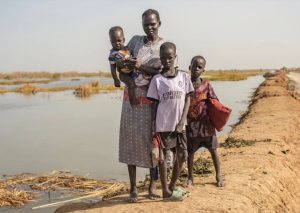Should we recognise three new kinds of refugees?
A controversial historian and journalist has suggested the world should recognise three new kinds of refugees who have emerged as the numbers of displaced people surges to record levels.
Vijay Prashad, who is executive director of the Tricontinental Institute for Social Research, says that third world debt, regime change and global warming have created new classes of refugees.
He says that of the total of 281 million recorded migrants, 26.4 million are registered refugees and 4.1 million are registered asylum seekers.
Mr Prashad says that this means that many of the other 250.5 million migrants are either IMF, regime change, or climate change refugees.
“When the UN’s World Migration Report 2024 notes that ‘the number of displaced individuals due to conflict, violence, disaster, and other reasons has surged to the highest levels in modern-day records’, it refers to these migrants and not strictly to those who are fleeing persecution,” he said.
Mr Prashad terms the first group as ‘IMF refugees’.
“Almost every developing country was struck by the Third World Debt crisis, exemplified by Mexico’s bankruptcy in 1982. The only antidote available was to accept IMF conditionalities for their structural adjustment programs,” he said.
“Developing countries had to cut subsidies for health and education and open their economies for export-oriented exploitation.
“The net result was the degradation of livelihoods for the majority, which threw them into precarious occupations domestically and toward dangerous overseas migration.”
 Mr Prashad cites a 2018 report from the African Development Bank that showed that, due to the attack on global agriculture, peasants in West Africa have moved from rural areas to cities into low-productive informal services.
Mr Prashad cites a 2018 report from the African Development Bank that showed that, due to the attack on global agriculture, peasants in West Africa have moved from rural areas to cities into low-productive informal services.
“From there, they decide to leave for the lure of higher incomes in the West and in the Gulf. In 2020, for instance, the largest migrations were to three individual countries (the United States, Germany, and Saudi Arabia), where the treatment that migrants receive is often appalling. These are migration patterns of great desperation, not of hope,” he said.
The second new group are ‘regime change refugees’.
Mr Prashad says that regime change has created economic chaos and brought widespread distress, citing the 6.1 million Venezuelan migrants who have left their country.
The third group are ‘climate change refugees’.
“In 2015, at the UN Climate Change Conference (COP21) in Paris, government leaders agreed to set up a Task Force on Displacement,” Mr Prashad said.
“Three years later, in 2018, the UN Global Compact agreed that those on the move because of climate degradation must be protected. However, the concept of climate refugees is not yet established,” he said.
In 2021, a World Bank report calculated that by 2050 there will be at least 216 million climate refugees.
As water levels increase, small islands will begin to disappear, making their populations survivors of a catastrophe that is not of their making.
“No migrant wants to leave their home and be treated as a second-class citizen by countries that forced their migration in the first place,” Mr Prashad said.
He says women especially do not want to travel long distances, as the threat of gender-based violence poses a greater risk to them.
“They would prefer dignity wherever they choose to live. New development policies in poorer nations, an end to forced regime changes that bring war and destruction, and more robust action on the climate catastrophe: these are the best approaches to tackle the enlarged refugee crisis,” he said.












